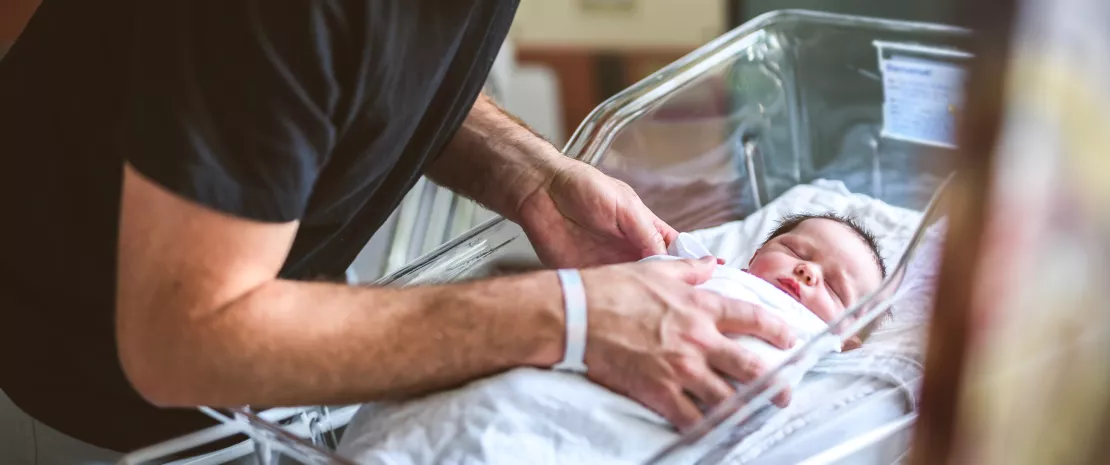Infant microbiota also passed down by father
While mothers are the first to seed their child’s digestive tract during vaginal births, the father also plays a role in building the child’s microbiota, and more and more so as the months go by. This complementary transfer of flora is essential for children born by Cesarean section, who are partly deprived of their mother’s flora.
Lay public section
Find here your dedicated section
Sources
This article is based on scientific information

About this article
Newborn babies acquire some of their mother’s vaginal and fecal flora during birth. However, in Cesarean births, this initial seeding is disrupted, facilitating colonization by pathogens.
Many questions remain about this initial digestive flora. For example, what are the seeding dynamics of the GI system? Where do the additional microorganisms come from, given that the child shares only half of its microbiota with its mother?
Suspecting that father plays a role, scientists 1 have investigated gut flora sharing and transmission dynamics between mother and child and father and child. They did so by studying data for 53 families of infants born by vaginal delivery and 21 by cesarean section from the Finnish HELMi 2 longitudinal cohort, as well as data for 7 families from the SECFLOR 3 cohort (children born by Cesarean section and subject to (sidenote: Fecal Microbiota Transplantation (FMT) A therapeutic procedure to restore the gut microbiota by transferring fecal bacteria from a healthy donor to a recipient. Explore https://www.science.org/doi/10.1126/scitranslmed.abo2750 ) ).
1/4 Cesarean deliveries currently account for over a quarter of births worldwide.¹
Paternal microbiota: stable and complementary
Samples taken from infants, mothers, and fathers suggest that transmission of the paternal gut microbiota complements maternal seeding.
Above all, while the maternal contribution diminishes after initial inoculation during birth, and is disrupted in the event of Cesarean section, the father is a stable source who seeds the child’s gut microbiota regardless of the mode of delivery.
What’s more, the father is a major source: by the time the child blows out its first candle, his contribution is comparable to that of the mother. The study also shows that overlap between paternal and maternal strains is rare, underlining the complementarity of these two sources in the construction of the infant microbiota early in life.
These data underline the father’s key role as a source of microorganisms. This role is all the more important given that, in Cesarean deliveries, only the mother receives antibiotic prophylaxis. The father’s untouched flora thus becomes essential.
60% of those surveyed are unaware that the mode of delivery can affect the gut microbiota of newborns.⁴
Fecal rather than vaginal FMT
While transfers of maternal vaginal microbiota, which is less diverse than gut microbiota, had previously shown limited benefit, this study also highlights the value of FMT of maternal fecal microbiota, which offsets the effects of Cesarean section:
- the microbial richness of the newborn’s microbiota is restored, with an increase in Bacteroides (B. dorei, B. fragilis and B. vulgatus) and Bifidobacterium (B. adolescentis, B. pseudocatenulatum and B. longum),
- colonization by pathogens such as Clostridium perfringens, Enterococcus faecalis, Klebsiella oxytoca, Klebsiella pneumoniae is reduced,
- the effects persist over time (at least one year).
Furthermore, the researchers observed preferential colonization by bacteria capable of breaking down the sugars in breast milk. All of these strains could potentially be developed into future probiotics for newborns.






